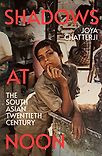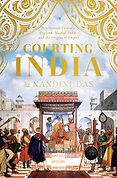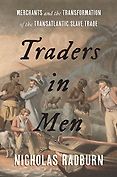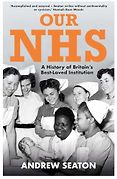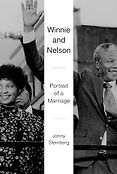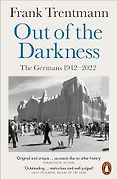For people who don’t know the Wolfson History Prize, could you start by telling me what kind of books you, as judges, are looking for?
What we’re trying to do is to find the best history books created within the UK in the last year. ‘Best’, of course, is a very difficult word. What we’re looking for is both originality and thoughtful analysis and readability. That’s the really important element of the Wolfson History Prize: these are books which are not just meant for historians to read—professionals, scholars—but will reach that great wider public which is interested in history, wants to know more about historical topics and widen its knowledge of history. So that’s a vital criterion: that the book should be enjoyable to read and make you feel that you’re encountering a work of art as much as a work of historical science.
I had a discussion about the prize with Donna McBride, who ran a history book club at the Dallas Institute of Humanities and Culture. The books on the shortlist are generally pretty highbrow. Would a “popular” history book be able to qualify?
It would have to be original. That’s the other important prong of it. We’re not just looking for surveys of things we know about, written in a jolly way. There are plenty of those. It’s that sense that the author has taken a subject—which may be a really familiar subject, Henry VIII or something like that—but seen something new in the situation which makes it distinctive, which presents a new perspective to the reader.
And may do so at some length: some of the books on this shortlist are pretty intimidatingly large. We cannot be afraid of that, because people who read history are, on the whole, not worried about long books.
Now, you mentioned that the book has to be created in the UK, but this year’s shortlist is pretty international, isn’t it?
It is. It’s international in subject and in the people who’ve written the books, but they are all based in the UK. That is, I think, a very important principle. What we’re trying to do is to emphasize that one of the last great assets that this country possesses is soft power—in ideas, in academic excellence. Our universities are second to none worldwide and we have more in a rather small country than you’d expect. Here is a set of scholars—mostly in universities, but not all—presenting really high-quality product to the world. That’s the glory of this country’s culture: it is an amalgam created by all sorts of people, and so are the books which this prize has honored.
Let’s go through the books on the 2024 shortlist. Let’s start with Shadows at Noon: The South Asian Twentieth Century by Joya Chatterji, who is a professor at Cambridge. Could you say briefly what it’s about and why it made the shortlist?
The book is about India in the 20th century, which means taking it from the late Victorian period, when it had become an empire under Queen Victoria, through to its present form, which consists of three large nations—India, Pakistan and Bangladesh—important on a worldwide scale. That is not an easy task, because the history is crowded with agendas and assumptions.
There is the assumption of Britain being a good imperial power or a very bad imperial power. There is the assumption that in 1947 a tragedy happened, Partition. As I read it, I was testing my own assumptions against these inherited ones and found the book extraordinarily fresh. It is written by a citizen of modern-day India, but she has examined her own assumptions, her own experience, and created something which I found surprising and new.
There is perhaps an optimistic message behind the book, that despite all the tragedy of the history of the sub-continent in the 20th century, these are three countries which have much more in common than many of their leaders admit. Behind the rhetoric, they have quietly cooperated across borders. There’s the striking story of the subcontinent’s ability to feed itself in the 20th century. That’s remarkable and includes distributing water. It doesn’t sound dramatic—it’s not as dramatic as a war—but it’s absolutely essential to the way that India’s, Pakistan’s, and Bangladesh’s agriculture have been transformed from catastrophe under the British Raj into that enviable and absolutely necessary ability to feed their own people today.
For those who know only a bit about Partition and the creation of Pakistan in 1947 or Bangladesh’s independence in 1971, does the book cover the basics as well? Or is this more a book for those who already know the story well and are looking for a new angle and research?
It’s very clever. Joya Chatterji is an old hand at writing high-class history. You don’t know what your readers know. And so underlying the surprising detail and the new perspective is that quiet sense of narrative and structure, which is really impressive, I think. As you say, there are absolute nodal points in this story which the reader needs to know. There’s 1947, there’s 1971 and you need the story built around that structure.
For the next book, we’re sticking with India, but going further back in time, to the early 17th century. This is Courting India by Nandini Das, which already won the British Academy Book Prize. Tell me more about this book.
This one is very different in scale from Chatterji’s book. It’s the story of one incident, an unsuccessful embassy of a remarkable English Jacobean diplomat to India. So it’s uniting two places which previously had had virtually no contact, at a very specific time.
In 1615, Thomas Roe arrived as an ambassador to the Mughal Emperor from the court of King James I of England and VI of Scotland, hung around for three years, and really didn’t achieve anything. He was constantly ill. He misunderstood customs. He bigged himself up in his own mind but, very revealingly, left no trace in the diaries of the Mughal emperor, Jahangir, whom Roe presents as a bosom buddy and hugely impressed by him. Clearly, Jahangir wasn’t. Roe was a bedraggled person from a puzzlingly faraway country with which the emperor had very little dealings and not much interest.
In the past, Roe’s embassy has been presented as part of the grand narrative of British triumph in India—the first stirrings of the symphony. And in a sense, it was: perhaps by its failures, it taught the English, and then the British, what the problem was.
But it is fascinating because Roe was involved in the Jacobean court back home in London. He knew how courts worked, and so his observations are very interesting. He’s looking at a far greater, more powerful court in Delhi. He is often misreading situations, but applying the insights that a Jacobean courtier might apply. And he was a man of considerable world experience. He had traveled across the Atlantic as well as getting to India. He’s not naive but he is soaked, as we all are, in his own culture and finds it very difficult to understand what’s going on around him.
Let’s go on to Traders in Men: Merchants and the Transformation of the Transatlantic Slave Trade by Nicholas Radburn. This one is pretty horrifying, about the explosion in size of the British slave trade in the 18th century.
It is a deeply depressing subject. It’s hugely important, because once you’ve read this book, you can’t sustain complacent cliches about the Western part in the slave trade. The detail is extraordinary. What I found particularly interesting and different was the sense of the commercial dynamic driving it.
The story starts with one monopoly company, the Royal African Company, chartered by the English monarchy. It’s based in London but is elbowed out of the way by provincial merchants in Bristol and Liverpool. They create a trade that’s far more profitable because it is much better organized, with absolute cynicism about the subject of the trade: human beings. They’re treated as commodities with advantages and disadvantages. There are the young, the elderly, the weak, the sick, and then there is the absolute prize: healthy young adult males. The essence of the trade is to acquire those assets, sort them out, and get them across the Atlantic with minimum loss, i.e. death.
Radburn describes the ways in which these systems evolved. And it’s not just a story of bashing Europeans. He makes it quite clear that an essential part of this new, innovative, improved structure of the slave trade was a set of merchants who were African. It’s a tripartite trade. That’s a familiar phrase, but he’s very good at showing us how there are three sorts of actors organizing the trade. There are English merchants, African agents and collectors of people, and American merchants of English and Scots descent. For the trade, it was essential that these three sets of actors worked together and understood each other.
I was reading the beginning of it, about a 13-year-old boy from Ghana who is kidnapped while playing with friends. Is the whole book like that, with individual stories of those who were enslaved?
Yes, the enslaved people have to be rescued from anonymity. It’s quite difficult to do that, because an essence of the trade was to make them non-people—to take their names away, to remove them from individuality in the human race. Radburn has got to the sources which work against that demonic aim. There were people from the 18th century who told the story from within and were encouraged by Europeans to do so. This was a small minority of people, initially, who hated the trade and linked up with those who were the subjects of it.
Next up is Our NHS: A History of Britain’s Best Loved Institution.
This is a very big book about an institution which inspires enormous loyalty and that title, Our NHS, is absolutely on the mark. The story is beautifully told. The author, Andrew Seaton, feels very much part of the story of the NHS, but shows the difficulties of saying whose NHS it is. There is what he describes as a sort of nationalism around the NHS. There’s a great pride engendered by the Labour Party—who created the NHS—in it being a uniquely British institution, and it is often contrasted with the dysfunctional state of US medicine.
There are all sorts of ways in which the book reflects on its own preconceptions. ‘Our’ NHS: What about all the immigrants who have made it work since the 1950s? It could not have survived without them.
It also could not have survived without patients feeling that they had a wonderful deal from the NHS, against the forces of ‘neoliberalism’ (a word he uses a lot) and those who would wish to monetize it and turn it into a private enterprise. Mrs. Thatcher started down that road and found it difficult. So those who have never been enthusiastic about the NHS have had to persist with this organization. It is in a terrible state now because of the various assumptions about trying to make it profitable, and yet it is still there.
There was the ambiguity, during COVID, of people clapping for the NHS. It started as something spontaneous and joyful and defiant against an illness. The government tried to capitalize on that, and the clapping died away because people recognized they were being enlisted in a government propaganda project.
Does the book offer any insights into how the history of the NHS can help it navigate the present?
Not entirely, no. An honest historian should not make their work about how things must go on. Historians are not good prophets. What we can do is show the reality of the past and its complications, its complexities, and highlight particular features of that past. The theme of immigrants being the absolute bedrock of the service is really important, and that’s well taken.
It has been said that the NHS is the national religion now, rather than the Church of England. I’m sure that’s right: people esteem it for all its faults and are angry with it for not living up to their ideals in a way that religion once was.
Let’s turn to Winnie & Nelson: Portrait of a Marriage by Jonny Steinberg.
This is a hugely impressive book. It takes a very well-known subject—which has created stories of heroism and good triumphing over evil—and makes it much more complex. There is an intense evil in this book, which is the system of Apartheid which was the background against which the Mandelas had to live and exist. What Steinberg’s book so brilliantly shows is how the system damaged them. It made them both lesser people than they might have been. It brought out their worst features.
Steinberg is also a wonderful myth-buster. Winnie and Nelson are heroic figures, but there’s a lot which is not at all heroic about them. It’s a ‘portrait of a marriage’, a very loaded phrase, because it’s warts and all. It’s warts which many historians had not talked or not known about, and previous biographers had left out (which just illustrates how biography is such a treacherous thing: it can be utterly misleading by omission). At the crudest level, we hear about the love affairs of both parties, the way in which they emotionally tried to cope against the crushing, evil machine that they were fighting.
It’s both a history of South Africa with a freshness and a chilling detail that I hadn’t appreciated, but also makes one feel tremendously sorry for the two principal characters, in a Greek tragedy sort of way. Sometimes you’re just really cross with them. How could they end up doing such self-destructive things? In other words, the book brings the reader very close to two fascinating people who changed the world.
What a shame! I thought Nelson Mandela was one of the only 20th-century world leaders left one could admire without reservation.
Well, I’m sort of relieved that he isn’t, because it suggests that others can be like that. You don’t need to be utterly exceptional and a saint. He was exceptional, but you can go on having faults and still do wonderful things for the human race.
Finally on the 2024 shortlist, we’ve got a book about (mainly) post-World War Two Germany. This is Out of the Darkness: The Germans, 1942-2022 by Frank Trentmann, a UK-based, German-born historian.
This is a story of redemption. It’s a story with a constant moral edge. There is nothing wrong with history taking a moral stance, but there are so many that you’ve got to take about this story. It’s a complicated story of two countries struggling out of the ruins of one, and their eventual reunification.
It starts in Nazi Germany with the stories of individuals, illustrating the moral dilemmas of being part of a nation which is doing something utterly evil to some of its own people and to others too.
Then there is the utter desolation, the devastation of 1945. Germany was a bit like an alcoholic, it had to reach utter baseness, utter defeat and destruction in order to recognize its problem.
Then the next decades, as Trentmann lays them out, are interesting. They are a story of what happens when you, or most of you, have utterly rejected the ideology in which you’ve lived. You’ve painfully reconstructed something which the victors imposed, but which is very different in its embrace of democracy and its obstinate wish to tell truth.
It’s a complicated story, because both the republics which emerged from World War II handled their past in different ways. They both repudiated it, but East Germany, the DDR, was much better at facing its past than the Federal Republic. West Germany had so much evasion in its first few decades about who was a Nazi and who wasn’t, who deserved punishment or repentance and who didn’t.
Then there was that terribly painful set of generational conflicts in the 1960s and 70s, in both republics, but particularly in the West, where the furious, younger generation added a moral imperative to all the generational conflict they’d feel with their parents anyway. I remember it because I was there—on the streets, busking in the 1970s—and I experienced it at firsthand.
Trentmann tells us the East German story too. I did feel that occasionally he was harder on the East than other writers have been. He’s very much a Federal Republic person, but we all come from somewhere in our books.
Ultimately, it’s a celebration of a country which had nothing and reconstructed two different things. Now they’re one, and we see troubles again, but there is a sort of dogged optimism about the book which is encouraging. He lays out the evidence to allow you to draw a different conclusion if you want, but you see why the problems of the present day have emerged from the book.
It is intriguing, this transformation. Germany and also Japan are countries that we look up to now as having done so much right. How were they able to do that after 1945? It’s great to have this book on the shortlist.
My analogy throughout was of the recovering alcoholic. You can never cease to be an alcoholic, but you can learn from your past, and you can build a life in the awareness of it. The important thing is remembering it and being aware of it. This book is a profoundly impressive document about remembering that past.
Interview by Sophie Roell, Editor
November 29, 2024. Updated: June 25, 2025
Five Books aims to keep its book recommendations and interviews up to date. If you are the interviewee and would like to update your choice of books (or even just what you say about them) please email us at [email protected]
Five Books interviews are expensive to produce. If you've enjoyed this interview, please support us by donating a small amount.

